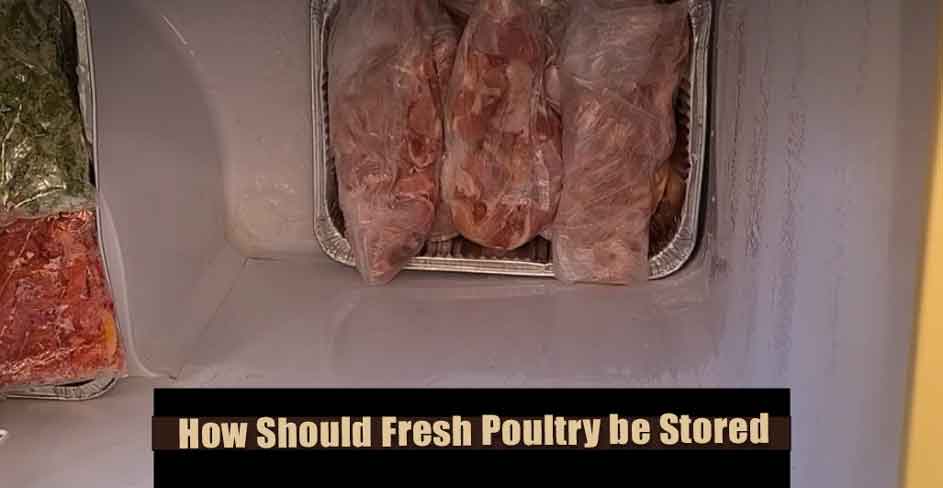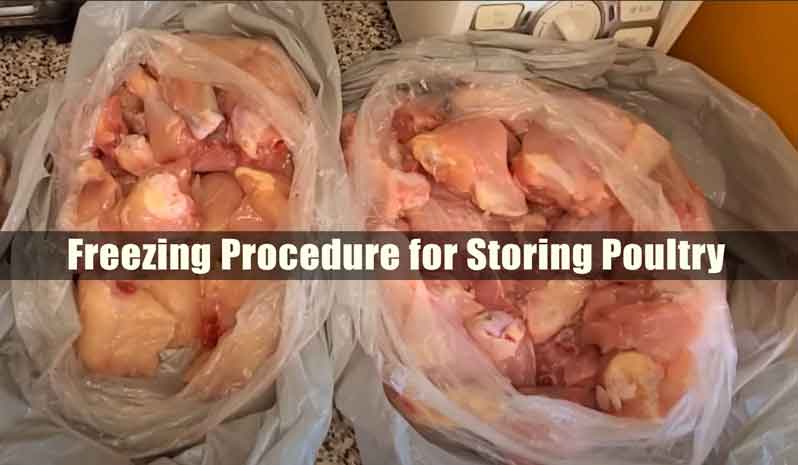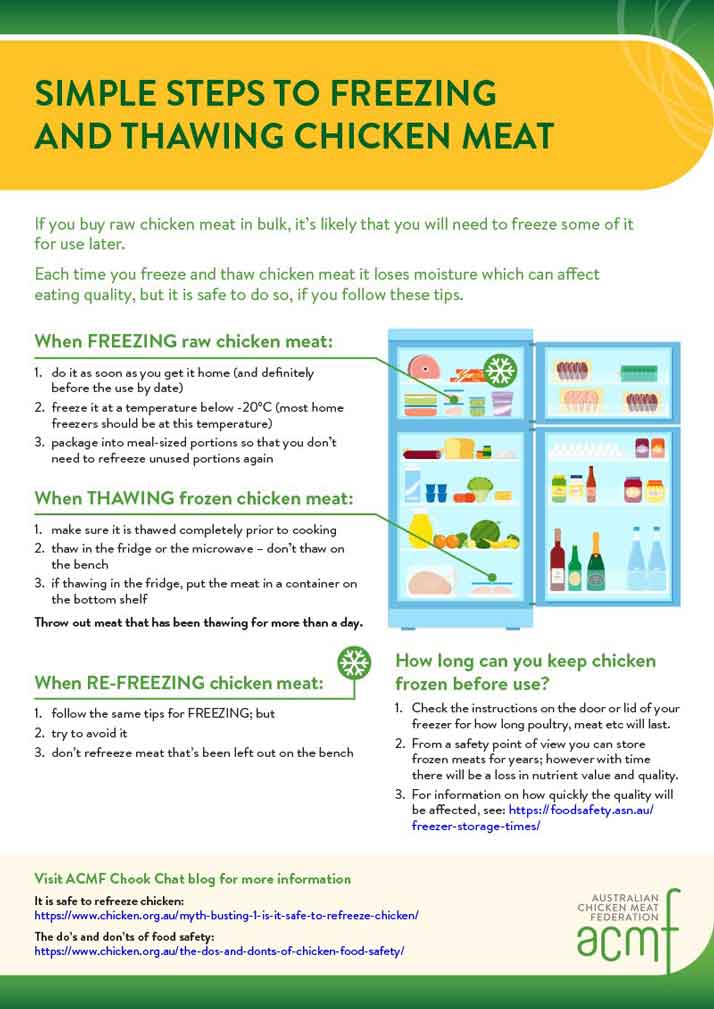To maintain safety, it is crucial to employ suitable handling and storage techniques while working with poultry. Because you can’t see the dangerous bacteria on the chicken or turkey, you must treat it as though it does.
Salmonella is a bacterium that occasionally infects poultry and can lead to food-borne illnesses. If you want to store fresh poultry safely and avoid contracting any infections, follow the instructions below.

Proper Storing Ways of Fresh Poultry
To prevent bacteria that cause foodborne illness from growing quickly, fresh poultry should be kept at a temperature that is outside the range. Between 40 and 140 degrees Fahrenheit is the danger zone.
For several days, poultry can be kept in the fridge. It should be stored if it won’t be consumed within the advised window of time to avoid perishing. Cooked chicken or turkey leftovers are to be tightly wrapped and put in the fridge as soon as possible.
A maximum of two hours should pass before removing the chicken from room temperature. Chicken or turkey that will not be consumed within 4 days of cooking should be frozen.
However, we’ll discuss two different methods of preserving fresh poultry here.
Refrigerating
In a refrigerator set at 40°F or lower, cooked or raw poultry can be kept for a few days without risk. The length of time it can be refrigerated depends on 3 things.
- The freshness of the poultry
- the temperatures it is subjected to during transportation from the market to home refrigeration
- the kind of packaging used
Remove the original packaging if raw fluids are dripping from it. Then put the fresh poultry in a bowl, cover it with wax paper or foil, or tightly wrap it in plastic before putting it in the fridge.

To avoid fluids spilling over onto other items, placing them on a dish with sides is advised. In order to prevent the raw juices from contacting other foods, it needs to be kept apart from them. The coldest part of the refrigerator is the perfect place to keep fresh poultry. If you are planning to use them in a proper indoor smokeless grill to make a tasty chicken grill for dinner.
In a refrigerator set to no more than 40°F, fresh poultry can be safely kept for two to three days. Ground poultry and chicken giblets should only be kept in the fridge for one day.
The chicken items should be frozen if you plan to keep them for a longer time. Before you’re ready to cook it, take the chicken out of the refrigerator.
To prevent prolonged exposure to room temperature, chicken or turkey remains should be chilled and refrigerated as quickly as possible. Never keep fresh poultry at room temperature for longer than two hours.
A refrigerator set to no more than 40°F can hold cooked chicken for up to 3 to 4 days. It is possible to freeze leftovers and keep them for up to 3 to 4 months if they aren’t consumed in that period.
To reduce the chance of bacterial growth, leftover stuffing must be taken out of the chicken as quickly as possible and placed in a closed container before refrigeration.
The filling can be kept for a maximum of three days, but it needs to be frozen if it won’t be consumed during that period. The duration of storage for stuffing in the freezer is one month.
Freezing Procedure for Storing Poultry
Fresh chicken needs to be kept in the fridge at 40°F or less. It needs to be consumed within 2 days of the package’s expiration date, and if not, it needs to be frozen.

Keep the Time in Mind
Although freezing is better to avoid since it makes chicken less soft and juicy, it must be done if the chicken won’t be used within that time frame to keep it from spoiling. If you keep it for long then a small slow cooker will not be enough to kook them.
Make sure the poultry is as fresh as possible before freezing. Take it out of the packaging it was originally in, and then tightly wrap it in plastic wrap, foil, or freezer paper.
Double Wrap the Meat
You should double-wrap your items if you plan to keep them for more than 2 months. To avoid the formation of ice crystals in any unwrapped areas, make sure the wrap is pushed securely against the whole surface of the chicken.
Because moisture has already been removed from the meat, the chicken has become tough in certain regions, leading to ice crystals forming. “Freezer burn” is the name given to this condition.
Also Read: Hen vs Rooster
Check How Long the Poultry Meat has Been Kept.
To know exactly how long it has been in the freezer, mark the wrapped box with the contents and the date. As soon as possible, the chicken needs to be frozen. It will thaw out better the faster it freezes.
Because these areas of the freezer are the coldest, placing the package there will hasten the freezing process. The freezer unit is always preferable to a refrigerator freezer for freezing and storing frozen food.
Keep Opening the Freezer in the Check
Food can be kept fresher for extended periods thanks to the freezer units’ ability to sustain temperatures of 0°F or lower. Since it is opened more frequently, a refrigerator freezer can maintain a constant temperature of 12°F to 25°F is limited.
Utilize meat that has been kept in a freezer within two to three months of purchase. Pieces of poultry can be safely kept for up to nine months, and whole chickens for up to a year when kept in a freezer unit. You can cook these items using any chicken cooker or egg frying pan.
Freezing Tips for Poultry
- Chicken should be frozen in moisture-proof wrap or bags. Wax paper should not be used since it is not moisture-proof and would not keep the moisture in the chicken.
- Make careful to mark every package with the contents and the date the contents were frozen.
- You can only remove the precise amount of chicken you need by individually wrapping each piece in foil or freezer wrap before putting them in a freezer bag.
- To preserve the greatest quality, freeze fresh poultry as quickly as possible.
- To maximize storage time, keep frozen turkey or chicken in a freezer.
- There are three ways to defrost frozen chicken: in the fridge, in ice water, with a change every 30 minutes, or in the microwave. Chicken should NEVER be thawed at room temperature.

Source: www.chicken.org.au
Final Verdict
Dangerous bacteria may be present in raw poultry, and in some extremely rare circumstances, these bacteria may cause serious sickness or even death. Many disease-causing bacteria may develop when poultry is improperly handled, processed, or kept.
You are responsible for maintaining a safe, orderly, and clean kitchen. Your family’s well-being and security depend on it. Therefore, don’t compromise it and adhere to the guidelines above.
